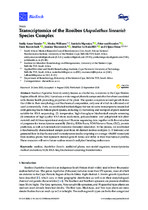Transcriptomics of the Rooibos (Aspalathus linearis) Species Complex
Date
2020Author
Stander, Emily Amor
Williams, Wesley
Mgwatu, Yamkela
Hesse, Uljana
van Heusden, Peter
Metadata
Show full item recordAbstract
Rooibos (Aspalathus linearis), widely known as a herbal tea, is endemic to the Cape Floristic Region of South Africa (SA). It produces a wide range of phenolic compounds that have been associated with diverse health-promoting properties of the plant. The species comprises several growth forms that differ in their morphology and biochemical composition, only one of which is cultivated and used commercially. Here, we established methodologies for non-invasive transcriptome research of wild-growing South African plant species, including (1) harvesting and transport of plant material suitable for RNA sequencing; (2) inexpensive, high-throughput biochemical sample screening; (3) extraction of high-quality RNA from recalcitrant, polysaccharide- and polyphenol-rich plant material; and (4) biocomputational analysis of Illumina sequencing data, together with the evaluation of programs for transcriptome assembly (Trinity, IDBA-Trans, SOAPdenovo-Trans, CLC), protein prediction, as well as functional and taxonomic transcript annotation. In the process, we established a biochemically characterized sample pool from 44 distinct rooibos ecotypes (1–5 harvests) and generated four in-depth annotated transcriptomes (each comprising on average ≈86,000 transcripts) from rooibos plants that represent distinct growth forms and differ in their biochemical profiles. These resources will serve future rooibos research and plant breeding endeavors.

